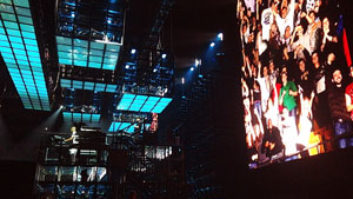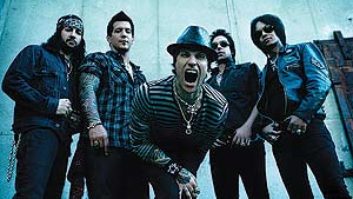“Rock and roll all night and party every day” is the modus operandi of any band worth their weight in piercings, or so we’re led to believe. But spend time with Buckcherry — brash, loud, covered in body art — and the stereotypes quickly disappear. No one knows this better than John Travis, who produced the band’s new album, Time Bomb.
Travis met with vocalist Joshua Todd, guitarists Keith Nelson and Yogi, bassist Jonathan Brightman and drummer Devon Glenn at their request. He’d received a 35-song work tape from the band and was familiar with their self-titled debut. “I took the meeting because they were interested in me as a producer,” he says. “I thought they were an interesting, cool band who could make a great record. When I met them, I realized how focused and driven they are, how intelligent and committed. That’s why it was important to me to do the record — because they were so passionate about it.”
Buckcherry introduced themselves to radio two years ago with the single “Lit Up,” a three-minute assault of cocky, aggressive vocals and driving guitars. While so many of their colleagues relied on DJs, samples, computers and assorted technology, Buckcherry’s back-to-basics approach owed much to early Aerosmith and the Rolling Stones and nothing to the Korn-field of new bands. Time Bomb remains true to those roots, its only change being that the band now has two guitarists, completing Keith Nelson’s mission.
“Things started changing while touring with Yogi,” he says, “because, for the first time, I started hearing the music as big as it was on the record. It changed the songwriting process, showed us where we could take things sonically. It was a big adjustment, but it was always the goal. The recording process [for Time Bomb] was a lot of fun, trading licks. For example, ‘Whiskey in the Morning’ was done live with the two of us facing each other, blowing solos at each other, adding textures and bouncing ideas.
“When Yogi joined the band, some of the pressure was taken off of me to cover all the bases. I could focus more on songwriting and honing in on what I do instead of just being the guy who carries the record and everything outside of the vocals and rhythm. Yogi’s an educated guy who’ll say, ‘You should go to the fourth,’ and I’ll say, ‘Is that the one with the dot on it?’ That’s not far from the truth. It’s an interesting combination. I think we both have a lot of respect for what the other guy does, so the key to it working is that we know when it’s on and when it isn’t.”
Buckcherry was again thoroughly prepared before entering the studio. “The first thing I was involved with was song selection,” says Travis, “myself, the band, Michael Goldstone [A&R, DreamWorks Records] and [manager] Scott McGhee. Then it was six to eight weeks of me driving to their rehearsal room every day, sitting with them, making suggestions on arrangements, bridges, chords, then leaving them alone and letting them work on it. There are very talented songwriters in this band; they’re all talented musicians, and it was better to let them take it in their direction. Then I’d come back and say, ‘I like it’ or ‘Try something else.’ Some of the songs were written several times until everyone was happy. I think every song stands on its own as being great. Some songs that didn’t make the record were still great.”
Because of this groundwork, songs were recorded in just one or two takes. “We were always going for the great overall track to add to the album, not to spend nine months in an overdubbing process,” Nelson says. “This band operates best when we don’t have to create at $2,000 a day. It’s so expensive and hard to survive in this business, so to try to make the White Album is ridiculous. You hear about people holed up in the studio and locked in for five months — don’t they know what they want? We’ve either got it or we don’t. When something doesn’t feel right, we move on.”
A musician himself, Travis was perfectly suited to complement Buckcherry. “I was a guitar and bass player in various bands in England and Germany,” he says. “Every time we recorded, the recordings never came out like I wanted them to. The guitars weren’t big enough; the drums weren’t big enough. One day I said, ‘Let’s pay for one more day and let me remix.’ Then other bands asked me to remix them. I interned in a studio, became assistant engineer, then engineer.” Travis worked in Berlin, England and then New York, where he spent several years producing rap records. “After a while, I thought I should be working with rock, because that’s the music I played and was into, and it seemed a waste to be a player who wasn’t playing. I spent two years engineering with Michael Beinhorn, who did Social Distortion’s White Light White Heat White Trash [Travis recorded the CD and mixed it with Social Distortion frontman Mike Ness] and David Kahne, who did two Sugar Ray records and a bunch of other things.” Travis’ diverse production credits include Dope, Wilco, Kid Rock, Chris Isaak, Monster Magnet and No Doubt.
I have no hard and fast rules on how to make a record. It’s always different, and you have to set up in a way to make the band as much at ease as you can, because the studio is a strange environment.
— John Travis
Buckcherry’s tour ended on January 2, 2000. The band worked on songs until May, then tracked for six weeks at Sunset Sound with Travis, engineer Jason Corsaro (Soundgarden, Madonna, Robert Palmer) and assistant engineer Geoff Walcha. James Barton spent two weeks mixing at Encore Studio. While the band did not co-produce, Nelson says they were involved from start to finish. “We’re very hands-on,” he says. “At the same time, we’re open to taking directions. We’re dealing with professionals, and that’s the reason they’re there in the first place — because we have a lot of respect for what they do. The real challenge is knowing when to stick up for something you really want to hear and when to shut your mouth. Some songs we definitely had ideas for. I had a vision I needed to see through for a few, whether it worked or not. Others, it was, ‘We have the songs, you’re the producer, where do you want to take it?’ There was a lot of interaction in the pre-production process of writing, moving songs in and out, working on parts with John. From what I hear from other bands, there’s not a lot of that kind of producing going on. They say, ‘I create the vibe for you.’ We know how to light incense; we don’t need that. We need someone to help make our songs as good as they can be.”
For Travis, that simply meant “getting the performances and making sure the band was comfortable enough in the studio to shine and do what they do best,” Travis says. “I have no hard and fast rules on how to make a record. It’s always different, and you have to set up in a way to make the band as much at ease as you can, because the studio is a strange environment. The whole band was set up all playing at the same time, and everything was miked up so they played like what they are: a live band. It was just a matter of getting takes, and they got them in one or two. They played live, and we got it on tape. It wasn’t really tough at all. Everyone is a great musician.
“The whole record was done analog,” he continues. “The drums were recorded at 15 ips, 16-track, 2-inch. Everything else — guitar, vocals, keyboards — was at 30 ips on 16-track, 2-inch. The record was cut through Sunset Sound Studio 3’s custom Demidio console. So many mics were used; we used an insane amount of equipment. There’s nothing in particular I have to have. I can use whatever’s around. I bring in lots of guitars, amps, basses and compressors, a truckload of gear, and some gets used. We used a ’65 Vox AC 30 Soldano rack; a Mellotron on a couple of songs. We didn’t record in Pro Tools, but a couple of sounds were manipulated in Pro Tools with a plug-in.
“My favorite part of making the record was, at one point, on ‘Whiskey in the Morning,’ Keith and Yogi were both playing through several amps with the sound blaring and solos live together and guitars sparring with each other. It goes on pretty much through the song — they answer the vocals with little licks, and there’s a part where they both play lead. That was a great moment. A lot of cool things happened in making this record.”
“One of the reasons we love John,” says Nelson, “is because he could have a conversation with us about T-Rex and Bowie and Exile on Main Street and Give ’Em Enough Rope by The Clash, and he can transcend that to make modern records like [Kid Rock’s] Devil Without a Cause. I love what he did with Social Distortion. He understands the past, the present, he has amazing ears and a sense of song and is a true producer in every sense of the word. He can get the sounds. He understands the dynamics of how bandmembers interact. He understands songwriting and how important this record is to us. He pushed us, inspired us to overachieve, and I think through that process we ended up a better band, better songwriters and better musicians.
“I think there’s something going on here that’s not present in music today,” he continues. “It’s the swagger and the energy of punk, a little sex appeal in the music and the vocals, combined with an amazing frontman with definitely his own take on lyrics and life. Joshua’s favorite artists are Michael Jackson, Prince, The Ramones and the Sex Pistols, and so as a band we have that whole spectrum… and he’s got to be able to dance to it, too.
“We’re not any more real than what’s going on, but hearing rich white kids from the suburbs talking about their bitches doesn’t seem real. In this day and age, to make it happen, the quick fix would be to get a DJ or a rapper on our record and have someone remix it, but that’s not a concern for us. It’s not a sprint; we’re in it for the long term. Who wouldn’t want to sell a million records? But earning our fans one show at a time, taking the slow road, is more fulfilling, because we’re doing so on our own terms. Being like our peers is not a concern of ours, because we get to make the music we want the way we want. This is the best job in the world; how can you complain about it?”



